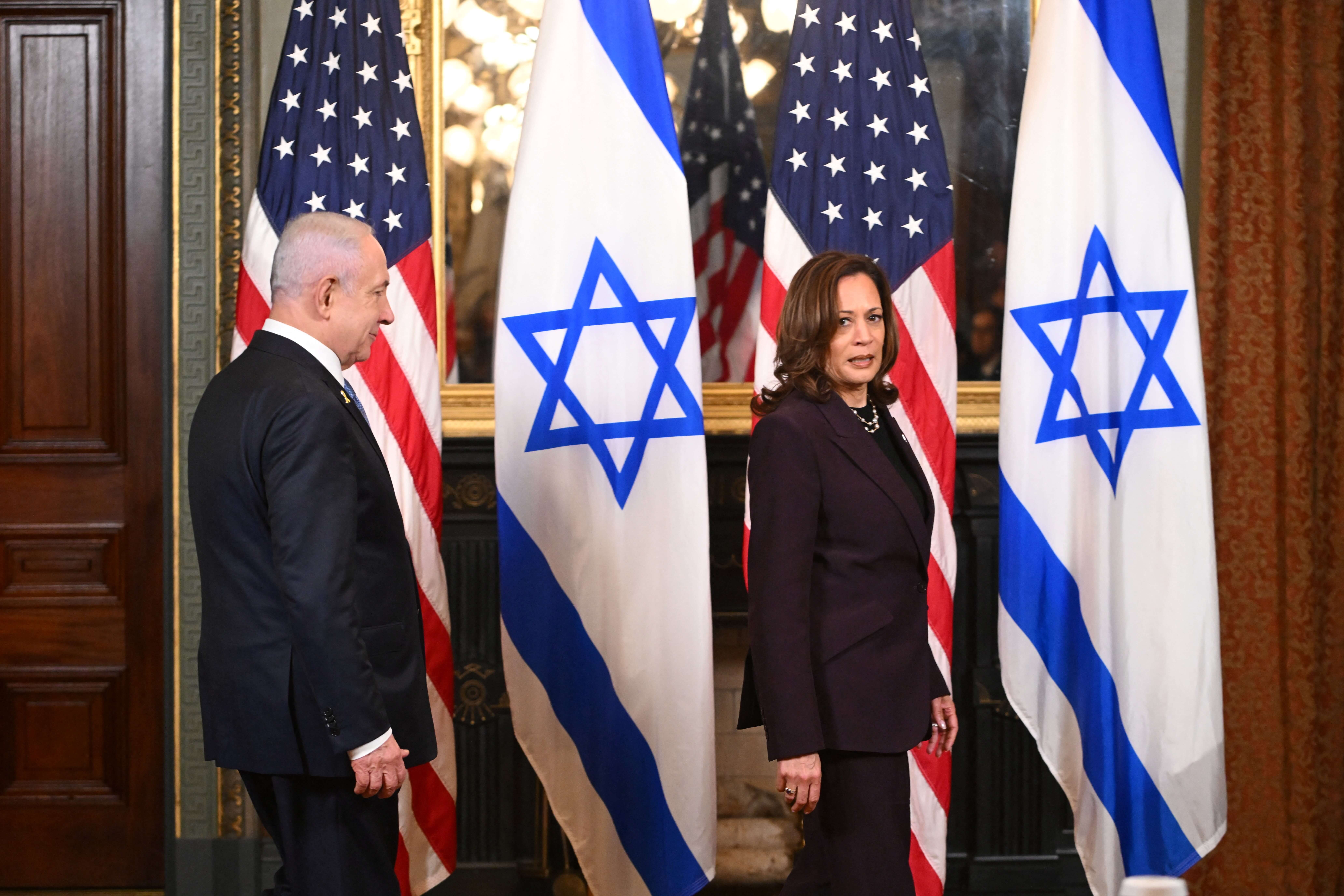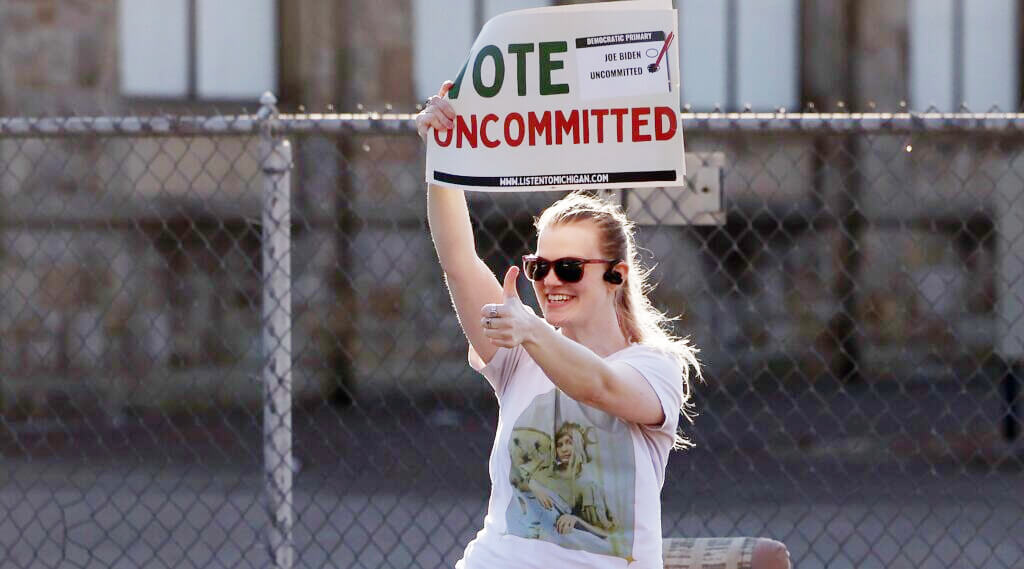Angry about Gaza, will uncommitted voters commit to Kamala Harris?
“She is more progressive and sees the humanity of Palestinians more than Biden ever did,” said one

Vice President Kamala Harris and Israeli Prime Minister Benjamin Netanyahu arrive for a meeting in the Vice President’s ceremonial office on July 25, 2024. Photo by Roberto Schmidt/AFP via Getty Images
Among the approximately 700,000 voters who cast “uncommitted” in Democratic primaries this spring to protest President Joe Biden’s position on the war in Gaza, there are some Vice President Kamala Harris will never win over and those she will never lose.
“She’s already been bought,” said Warren Fry, a Roanoke, Virginia, teacher who drove to Washington, D.C., on Wednesday to protest Israeli Prime Minister Benjamin Netanyahu’s address to Congress. The sign he brought said “Kamala is complicit in genocide.”
Then there’s Randy Leach, a columnist for the New Haven Register, who told readers that he voted “uncommitted” in the Connecticut primary in April “to send a message to the White House,” but this week said he would back Harris in November because he doesn’t want to help reelect former President Donald Trump.
There is not much daylight between Biden and Harris regarding the war, but there is some — Harris does not define herself as a Zionist, was earlier to call for a ceasefire and has been more openly sympathetic to the Palestinian protest movement. Analysts and activists are now watching to see whether she will win back some of the far left that had threatened to stay home in November rather than support the man they lambasted as “Genocide Joe.”
“Vice President Harris has a real opportunity right now to turn a new page with regards to Gaza policy,” said Abbas Alawieh, director of the Uncommitted National Movement. “Especially in the eyes of people for whom President Biden’s policy has been a deeply painful experience.”

Israel’s military campaign in Gaza has killed more than 39,000 Palestinians, according to the enclave’s Hamas-run health ministry. The race between Harris and Trump is a dead heat. And the uncommitted movement has been most active in Michigan, one of the crucial swing states that could decide the November contest, and home to more Arab Americans than any other state.
In the past week, since she became the presumptive presidential nominee, Harris has signaled that she would take a tougher tack with Netanyahu.
She skipped his address to Congress on Wednesday, and after meeting with him the next day, seemed to speak directly to uncommitted voters when she talked about the devastation in Gaza.
“We cannot look away in the face of these tragedies,” she said. “We cannot allow ourselves to become numb to the suffering. And I will not be silent.”
What uncommitted want to hear from Harris
Among some uncommitted voters, Harris has long had more credibility than Biden on Gaza. In March she became the first senior administration official to call for an “immediate ceasefire” in the conflict. And she is widely considered to have been among the stronger voices close to Biden advocating for more pressure on Israel.
“There has been some reporting out there, since October, that she is more progressive and sees the humanity of Palestinians more than Biden ever did,” said Nazita Lajevardi, a political science professor at Michigan State University who was among the 100,000 people voting uncommitted in Michigan’s February primary. “They’re waiting to hear what she actually thinks.”
Lajevardi said she would consider voting for Harris if the vice president commits to a permanent ceasefire in Gaza and to end American support for Israel’s military campaign there.
Alawieh, who in addition to heading the Uncommitted National Movement is a Michigan delegate to the Democratic National Convention, said he would like to come out of the convention in Chicago next month ready to give a “full-throated” endorsement to Harris.
But for that to happen, he said, she needs to meet with the convention’s 30 uncommitted delegates and push for an arms embargo against Israel, which is “what’s necessary to achieve a ceasefire.”
Harris may have a hard time meeting those demands. Though her expressions of empathy for Palestinians have been more emphatic than Biden’s, she has backed Biden’s overall approach toward resolving the Israeli-Palestinian conflict. And campaigning in 2020, she pledged that a Biden-Harris administration would continue unconditional military aid to Israel.
But Alawieh indicated that uncommitted voters may be willing, if Harris engages with them “meaningfully,” to relax some of their demands so that Democrats, united, can “pivot following the convention to beating Donald Trump.”
“I do not anticipate that Vice President Harris will adopt the same policy positioning on this as I might want her to, 100%,” he said. “But I do think that there are real steps that she can take to demonstrate that she is listening to the demands of our movement.”
Some Democrats say that uncommitted voters will come out for Harris whether she pivots on Gaza or not. They’ll fear, the reasoning goes, that withholding votes for her would boost Trump, who courts donations from right-wing supporters of Israel and once called for “a total and complete shutdown of Muslims entering the United States.”
But Lajevard said if she doesn’t vote for Harris she won’t feel partly responsible for a Trump victory.
“That’s not my cross to bear,” she said.
Beyond the uncommitted
Younger Americans and those of color, more than Americans in general, disapprove of Israel’s conduct in the war in Gaza, polls show.
James Zogby, a pollster and founder of the Arab American Institute, said that the “Obama coalition” — Arab Americans, Blacks, Latinos, Asians, young people and progressive Jews who came out in droves to elect the first Black president — ”are people we’re losing because of Gaza.”
Zogby is a Harris supporter, and said in an interview that she could lay out an understanding of the Israeli-Palestinian conflict — one that shows the U.S. wants security for both sides — that would appeal to a wide set of voters well beyond Michigan. Facing Trump, “it’s vitally important that we not hemorrhage these votes,” he said.
But is there another possibility, that a significant portion of uncommitted voters will support Trump in November?
Osama Siblani, who publishes the Arab American News in Dearborn, Michigan, and voted uncommitted in its primary, said he wouldn’t rule the possibility out, even though nearly 60% of Arab Americans voters supported Biden over Trump in 2020.
“In 2020 we voted against Trump, and what happened? We didn’t get anything,” Siblani said, referring to the president’s handling of Oct. 7 and its aftermath.
Trump campaign officials reached out to Siblani recently to arrange a meeting with Arab American leaders, Siblani said, adding:
“If they’re willing to listen, we’re willing to talk.”
A message from our Publisher & CEO Rachel Fishman Feddersen

I hope you appreciated this article. Before you go, I’d like to ask you to please support the Forward’s award-winning, nonprofit journalism so that we can be prepared for whatever news 2025 brings.
At a time when other newsrooms are closing or cutting back, the Forward has removed its paywall and invested additional resources to report on the ground from Israel and around the U.S. on the impact of the war, rising antisemitism and polarized discourse.
Readers like you make it all possible. Support our work by becoming a Forward Member and connect with our journalism and your community.
— Rachel Fishman Feddersen, Publisher and CEO




























